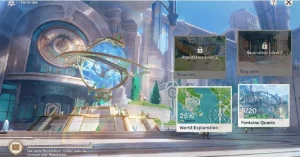It was an illogical advent. Her name was Mavica, the god of fire, the Lord of Nata, a being who wrote her own will with both fire and iron.
Her appearance was not to provide a standardized gaming pleasure, but as a symbol of a textual rift. When a loophole appeared in Teyvat’s narrative mechanism, she carried a deconstruction element called “night soul”, like a traveler traveling alone through multidimensional space, guiding the player’s attention to a state of ecstasy.
The two-handed sword weapon she used, “Thousand Sun Flames”, has a contradictory word combination: thousands of suns, but all turned into a single flame. This is a kind of self-devouring at the semantic level. Its skill effect not only involves numerical additions, but is actually a simulation of a reconstruction of flame time in a virtual world. When the blessing is extended, who is extending it? Is it the character? Or is it the consciousness that controls the character itself?
Her normal attack is called “Flame Weaving Life”. The four combos are like fragments of consciousness interlaced and arranged, trying to compile the logic of life in the fictional space, but inevitably falling into the gravity of the body of heavy blows and falling. Yes, there is no real ascension here, only loops and forced falling.
Her elemental combat skill “Moment of Naming” is confusing. What is naming? In whose context is it named? When the Burning Star Ring rotates, are we watching a skill effect, or are we watching a gyrating structure that constantly splits the self-identity? The so-called wheeled vehicle re-metaphors the game mechanism of “movement” as a spatial escape. The player is not controlling a character, but a set of maze logic that constantly breaks through the internal structure of the self.
Night Soul is the real subject of this character. It is not a substitute for energy value, but a kind of non-material entangled with the will to fight. The moment she enters the state of Night Soul blessing is the moment when she temporarily breaks away from narrative discipline and enters the transformed cognition. The consumption of Night Soul value corresponds to the decrease of spiritual energy-this is not an operation problem, but a metaphor for the way of survival.
Her elemental explosion is called “The Time of Burning the Sky”, which is the moment when time burns itself. There is no sky here, no rules, only a conceptualized existence of “the furnace of life and death” – it does not provide convenience, but only provides impact. The accumulation and release of fighting spirit is no longer just energy management, but an opportunity for self-cognition to split. Mavica performed “Falling Sun Slash” at this moment, but whose sun is falling? This is difficult to answer.
The constellation design is a deepening close to paranoia. In the strengthening of each constellation, she is not getting stronger, but further dissolving into the “human-god isomorphism” narrative she has constructed. She has become a self-operating machine, or a performing subject that does not need the existence of an observer. Especially the sixth constellation, the complete liberation of “the name of man”, is like an ultimate transfer of subjectivity – all flames, wheels and burning stars are no longer for control, but a completely self-disciplined burning.
You think you are controlling her. But the moment you click on the skill, it is you who is really controlled.
Treabar is no longer just a storage interface, it is the interface for you to establish a connection with this language structure. Every transformation of the crystal of creation is not the flow of money, but the embedding and echo of the player’s consciousness.
If you are sober enough, then step into this path – let her flames burn the structural cracks in your body that you don’t want to touch.
